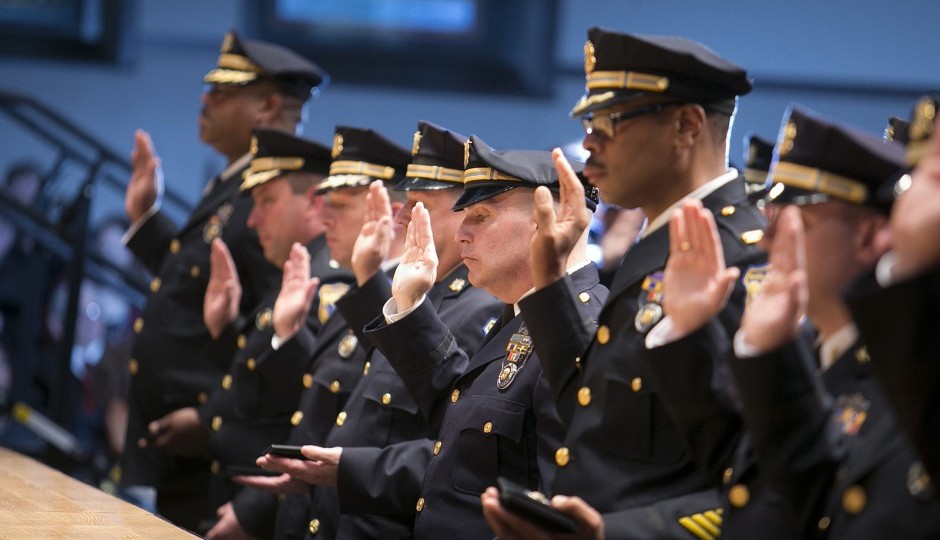The Brief: Why Are Minorities Shunning Careers as Cops in Philly?

A Philadelphia Police Department promotion ceremony. | Copyright City of Philadelphia. Photo by Mitchell Leff.
1. Why does the Philadelphia Police Department have so few minority recruits?
The gist: Citified and other outlets have reported before on the race gap in the Philadelphia police department. Compared to the demographic makeup of the city itself, white cops are over-represented, and black, Latino and Asian cops are underrepresented. But why? Mensah Dean takes a stab at answering that question in a Daily News cover story today that focuses on the department’s recruiting practices. Dean zooms in on hiring requirements that include a polygraph test, a minimum of 60 hours of college credit and psychological exams. The report suggests those requirements — which were put into place by Police Commissioner Charles Ramsey — are creating unnecessary hurdles, particularly for would-be minority recruits.
Why it matters: Ramsey co-chaired President Obama’s task force on 21st Century Policing, and one of its key recommendations was for police departments to diversify their workforces. The Daily News report suggests Ramsey could start at home.
Ramsey, of course, is probably the most popular public official in Philadelphia, and he’s widely regarded as an excellent commissioner. But he can be a little slow to embrace change (think about his resistance to marijuana decriminalization). His future in the city is also in question. With a new mayor being sworn-in next January, Ramsey’s fate is up in the air. True, Democratic mayoral nominee Jim Kenney has said repeatedly that he’d like to keep Ramsey, the commissioner may decide it’s time to retire, or try a new challenge in a different city. Kenney could also quietly send the message that he’d prefer to pick someone new.
2. Council President Darrell L. Clarke tries, again, to get control of rogue community groups.
The gist: Jared Brey reports for PlanPhilly that Clarke has prepared a bill in cooperation with the Planning Commission that would add a new layer of rules and requirements for Registered Community Organizations, an official city designation that was created when the new zoning code was adopted. RCOs have a formal role in the development approval process, and, well, some abuse that role. A lot of RCOs are completely responsible, long-established community groups, with bylaws, open meetings and plenty of transparency. Others, not so much. Clarke’s bill would require RCOs to operate under the city’s official Standards of Conduct and Ethics. Writes Brey:
A number of the amendments included in Clarke’s draft bill seem to be aimed at compelling RCOs to operate transparently and in the neighborhood’s interest. In addition to the ethics requirements, the bill contains provisions that would cause RCOs to lose their status for deliberately falsifying information on applications, for refusing to coordinate meetings with other groups, or for failing to carry out the basic requirements for notification of public meetings. It would also require groups to summarize their meetings and provide a rationale for positions they take, or to document their efforts at setting up a meeting with developers if the meeting doesn’t take place.
Why it matters: Rogue and/or overlapping RCOs have been a huge headache for developers and more responsible RCOs pretty much ever since the city began officially recognizing the organizations. The trick for the city is to create a mechanism that allows for true community input, without giving every neighbor with a gripe and an “organization” undue influence over development. The balance has proven very difficult to strike.
3. The election is won, but Jim Kenney is keeping up an active schedule of public appearances.
The gist: Wendy Ruderman observes in the Daily News that Kenney is keeping up a pretty active public appearance calendar.
Why it matters: The months in between the primary election and the general in November are crucial ones, and not just because Kenney still has an election to win. Presuming his only foe is Republican Melissa Murray Bailey, his victory is not in doubt. But he can’t quite act like the mayor-elect. That would be presumptuous. On the other hand, it would be a waste of valuable time to spend the next five months in a full time campaign against Bailey, when he could be putting together his administration. Who will he hire? What’s his first 100 days agenda? Michael Nutter was criticized in 2007 for using his post-primary months as a victory lap, instead of a prep period for the hard slog to come. What balance will Kenney strike?
Connect with Citified
- Send tips to citified@phillymag.com.
- Sign up for the weekly Citified newsletter and never miss our best work.
- Follow us on Twitter @CitifiedPHL.
- Follow our writers on Twitter: @pkerkstra, @hollyotterbein, @malcolmburnley.